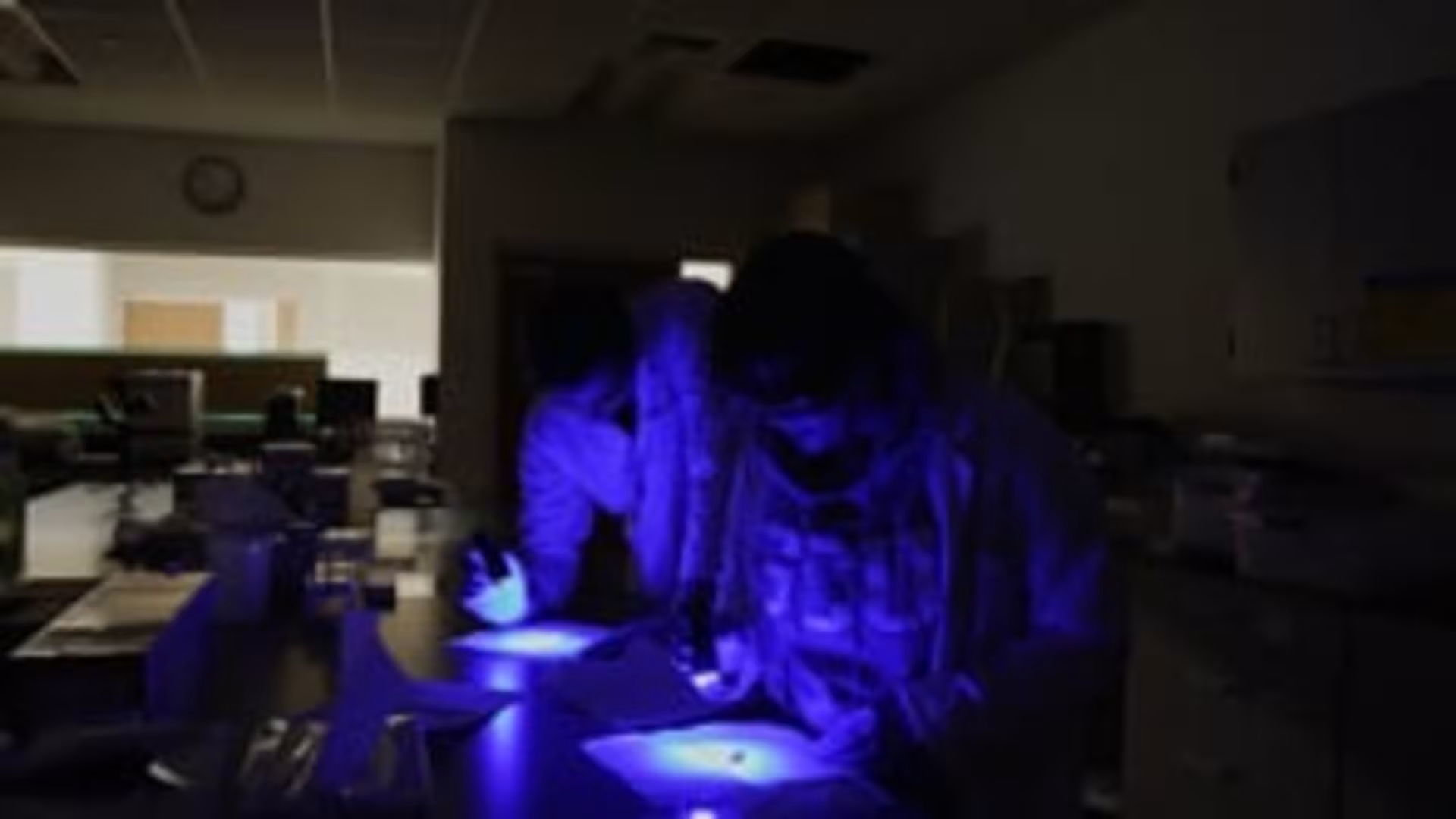
Bachelor’s Degree in Forensic Science
Discover the Science Behind Modern Crime Solving
Forensic science is a multidisciplinary field that combines many areas of study, including chemistry, physics and biology. Its purpose is to support the efforts of the legal system, particularly the criminal legal system.(See disclaimer 1) If you aspire to help crime victims and their families achieve justice, the Bachelor of Science in Forensic Science at GCU offers essential education in crime scene investigation and specialized areas like toxicology, physical evidence examination and DNA.

Campus: $8,250 per semester [More Info]
Up to 90 credits, only 84 can be lower division
Credits: Fill out the Lopes Eval to find out what will transfer
Admission Requirements (Bachelor's)
- 16+ years old
- High School Graduate
- 3.0+ Unweighted GPA
OR 2.5+ Unweighted GPA and
- ACT: 19
- SAT: 1000*
Admission requirements may differ based on degree level, program and modality, or transfer status. Some programs of study may require a higher GPA and/or other qualifying criteria for admission. Please review full admission and program requirements in the University Policy Handbook.
*Math and reading only on a 1600 point scale (test date after 3/1/2016). SAT score of 1380 required for 2400 point scale (test date before 3/1/2016).

Analyze Biological and Physical Evidence With Precision
This bachelor’s degree in forensic science combines a foundation in biology and chemistry with specialized knowledge in forensic photography, analysis and processing. Experienced faculty will guide you through scientific procedures for investigating and analyzing evidence. The program also covers legal procedures and criminal law, which are essential competencies for a well-rounded understanding of the field.
GCU strives to provide an engaging and enriching learning community for our students. As an on-campus forensic science major, you can benefit from an intellectually stimulating environment that offers numerous opportunities for personal growth outside the classroom. The Forensic Science Research Lab, through Canyon Emerging Scholars, allows campus students to dive further into field research. Immerse yourself in a Christ-centered community, with the Christian worldview integrated into every degree program.
Bachelor of Science in Forensic Science Coursework
During this forensic science degree program, you’ll dive into a variety of courses that teach the essential skills for forensic investigation, including evidence-based practices. You will also have the opportunity to take specialized classes that explore the legal side of forensics, covering essential topics like courtroom procedures, evidence collection and presentation.
These course topics are designed to equip you with a deep understanding of the intricacies of forensic investigations and can help you prepare to pursue specialized roles in the field.
Topics covered in forensic science courses include:
Body fluid and DNA analysis
Biology
Crime scene processing and reconstruction
Criminal justice
Genetics, including population genetics
Human anatomy and physiology
Instrumental analysis
Organic chemistry and chemical reactions
Analysis of physical evidence
Physics
Fundamentals of biochemistry
Toxicology
Apply Classroom Knowledge Through Lab Work and Research
While pursuing your degree, you’ll have many hands-on learning opportunities, such as lab work and field research projects, which allow you to apply classroom theories. These experiences can help you develop essential skills, such as analytical reasoning, attention to detail and communication, all of which are vital in forensic science.(See disclaimer 2)
You will examine mock crime scenes and work on essential tasks, such as photographing, documenting, collecting and analyzing evidence to establish connections among the victim, suspect and scene. You’ll be guided in the use of forensic science technology, including laboratory instruments. This bachelor’s in forensic science can provide preparation for graduate work in specialized areas of forensic science.
Career Paths for Forensic Science Bachelor's Degree Graduates
With a firm grasp of forensic science competencies, you may be prepared to seek employment in various work settings, such as local or state government agencies, educational institutions, testing laboratories and medical and diagnostic labs.(See disclaimer 3)
You can apply your knowledge to assist in the following:(See disclaimer 4)
Crime scene investigations
Serology and DNA analysis
Firearms analysis
Toxicology and drug analysis
Latent fingerprint development and analysis
Medicolegal death investigation
Autopsy assistant
Research projects
Legal proceedings
Estimated job growth for forensic science technicians from 2024 to 2034(See disclaimer 5)
Median annual wage for forensic science technicians as of May 2024(See disclaimer 6)
Earn Your Forensic Science Degree From an Accredited University
As an institutionally accredited university, GCU prioritizes the quality of our instruction and curriculum. The Higher Learning Commission has continually accredited GCU since 1968. The College of Natural Sciences shares the university’s commitment to upholding the principles and standards established by our accrediting bodies.
Frequently Asked Questions
You may have questions about our forensic science bachelor’s degree and the career opportunities you may pursue. Check out the frequently asked questions to learn what to expect and determine if this degree is right for you.
What does a forensic scientist do?
What degree do I need to become a forensic scientist?
What can I do with a bachelor’s degree in forensic science?
Program Curriculum
General Education Requirements
Required General Education Courses
Core Courses

Transform your passion for science into a powerful force for justice.
- Dinis-Oliveira, R.J. (2025, June 17). Forensic Science or Sciences? The Recognition as an Independent Science and Redefinition of Expert Practices Based on Transdisciplinary. National Library of Medicine. Retrieved October 2025.
- Indeed Editorial Team. (2025, June 19). 18 In-Demand Skills for a Forensic Scientist to Learn. Indeed. Retrieved October 2025.
- U.S. Bureau of Labor Statistics. (2025, Aug. 28). Forensic Science Technicians: Work Environment. Occupational Outlook Handbook. Retrieved October 2025.
- U.S. Bureau of Labor Statistics. (2025, Aug. 28). What Forensic Science Technicians Do. Occupational Outlook Handbook. Retrieved October 2025.
- COVID-19 has adversely affected the global economy and data from 2020 to 2023 may be atypical compared to prior years. Accordingly, data shown is effective August 2025, which can be found here: U.S. Bureau of Labor Statistics, Occupational Outlook Handbook, Forensic Science Technicians, retrieved October 2025.
- The earnings referenced were reported by the U.S. Bureau of Labor Statistics (BLS), Forensic Science Technicians as of May 2024, retrieved October 2025. Due to COVID-19, data from 2020 to 2023 may be atypical compared to prior years. BLS calculates the median using salaries of workers nationwide with varying levels of education and experience. It does not reflect the earnings of GCU graduates as Forensic Science Technicians, nor does it reflect the earnings of workers in one city or region of the country or a typical entry-level salary. Median income is the statistical midpoint for the range of salaries in a specific occupation. It is very unlikely that a median salary will reflect an entry-level salary. It represents what you would earn if you were paid more money than half the workers in an occupation, and less than half the workers in an occupation. It may give you a basis to estimate what you might earn at some point if you enter this career. Grand Canyon University can make no guarantees on individual graduates’ salaries. Your employability will be determined by numerous factors over which GCU has no control, such as the employer the graduate chooses to apply to, the graduate’s experience level, individual characteristics, skills, etc. against a pool of candidates.
- CareerExplorer. (n.d.). Forensic Scientist vs. Forensic Science Technician. Retrieved October 2025.
- U.S. Bureau of Labor Statistics. (2025, Aug. 28). How to Become a Forensic Science Technician. Occupational Outlook Handbook. Retrieved October 2025.


